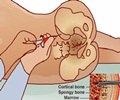With 100,000 infants dying from sickle-cell anaemia anually in Nigeria, the country accounts for more than half the child deaths from the disease in Africa each year, an expert said Tuesday.
"From available statistics, 100,000 infants die from sickle-cell disease in Nigeria annually, making it the number one sickle-cell endemic country in Africa," Sadiq Wali, president of the Nigeria Sickle-Cell Foundation, told AFP.According to the World Health Organisation (WHO), an average 200,000 infants are born with sickle-cell in Africa, with 150,000 of them found in Nigeria.
"Nigeria accounts for 75 percent of infant sickle-cell cases in Africa and almost 80 percent of infant deaths from the disease in the continent," said Wali.
Sickle-cell is a hereditary disease caused by a genetic mutation which results in the formation of sickle-shaped red blood cells that reduce the patients' ability to take in oxygen, making them susceptible to infections and early death.
"This genetic disorder alone accounts for eight percent of infant mortality in Nigeria, which calls for urgent attention," Wali said.
Around four million Nigerians suffer from the disease while 25 million others carry the mutant genes which they pass on to their offspring, Wali said.
Advertisement
"The mutant sickle-cell gene confers a survival advantage against malaria which explains the prevalence of the disease in Nigeria where malaria is endemic," Ibrahim Musa, a medical doctor at Kano general hospital, said.
Advertisement
Sickle cell can be treated through costly and complicated bone-marrow procedure. Experts advocate prevention rather than cure especially in poverty-stricken African nations.
"People should go for a genetic test in the same way they determine their HIV status before marriage as the most effective way to protect their children and curtail the disease," he said.
Source-AFP
SRM












